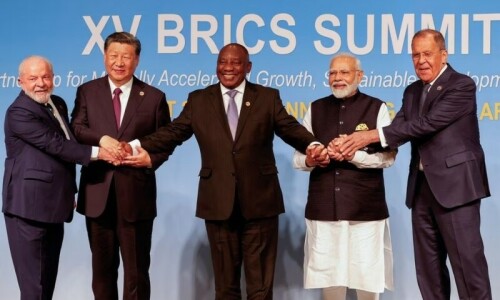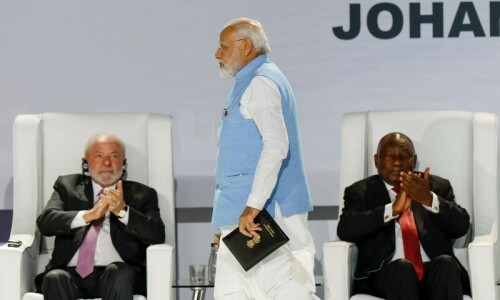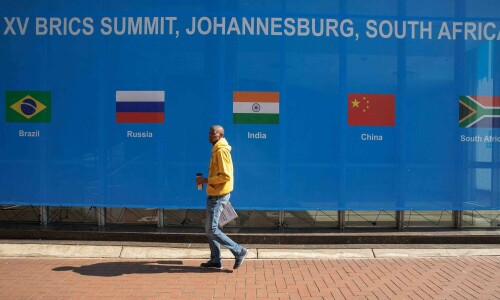
• Move aimed at accelerating group’s push to reshuffle ‘outdated’ world order
• Entry of oil powers highlights their drift away from US
JOHANNESBURG: The BRICS bloc of developing nations agreed on Thursday to admit Saudi Arabia, Iran, Ethiopia, Egypt, Argentina and the United Arab Emirates in a move aimed at accelerating its push to reshuffle a world order it sees as outdated.
The group’s leaders left the door open to future enlargement, potentially paving the way for the admission of dozens more countries motivated by a desire to level a global playing field they consider rigged against them.
The expansion adds economic heft to BRICS, whose current members are China, the world’s second largest economy, as well as Brazil, Russia, India and South Africa. It could also amplify its declared ambition to become a champion of the Global South.
But long-standing tensions could linger between members who want to forge the grouping into a counterweight to the West — notably China and Russia — and those that continue to nurture close ties to the United States and Europe.
“This membership expansion is historic,” Chinese President Xi Jinping, the bloc’s most stalwart proponent of enlargement, said. “It shows the determination of BRICS countries for unity and cooperation with the broader developing countries.”
Originally an acronym coined by Goldman Sachs chief economist Jim O’Neill in 2001, the bloc was founded as an informal four-nation club in 2009 and added South Africa a year later in its only previous expansion.
The six new candidates will formally become members on Jan 1, 2024, South African President Cyril Ramaphosa said when he named the countries during a three-day leaders’ summit he is hosting in Johannesburg.
The entry of oil powers Saudi Arabia and UAE highlights their drift away from the United States’ orbit and ambition to become global heavyweights in their own right.
“BRICS has embarked on a new chapter in its effort to build a world that is fair, a world that is just, a world that is also inclusive and prosperous,” Ramaphosa said.
“We have consensus on the first phase of this expansion process and other phases will follow.”
Iran’s President Ebrahim Raisi celebrated his country’s invitation to join BRICS with a swipe at Washington. “The expansion of BRICS shows that the unilateral approach is on the way to decay,” Iran’s Arabic-language television network Al Alam quoted him as saying.
Saudi Arabia’s foreign minister told Al Arabiya TV that the kingdom appreciated the invitation by BRICS to join the group and would study the details before the proposed Jan 1 joining date and take “the appropriate decision”.
Prince Faisal bin Frahan said BRICS was “a beneficial and important channel” to strengthen economic cooperation.
Published in Dawn, August 25th, 2023













































